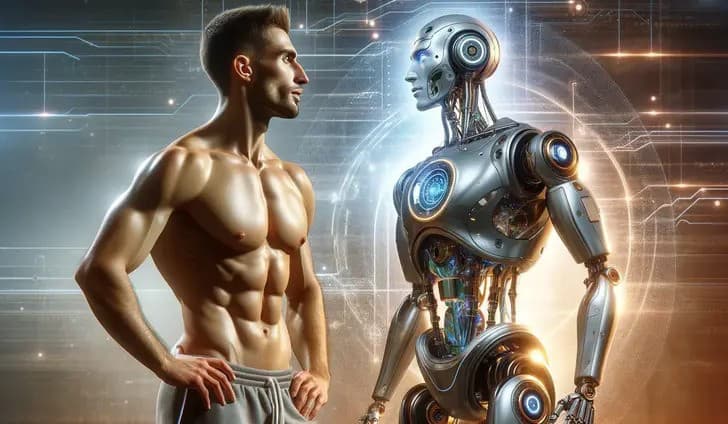Artificial intelligence chews through data like a kid with a bag of candy, but can it really wrap its circuits around why someone would shrug off starting an online business? This isn’t about tech-hating loners; it’s about people who choose a life less digital for reasons that feel deeply human. So here's a philosophical romp, exploring whether AI - with all its smarts - can truly vibe with motivations that prioritize offline living over e-commerce glory.

AI’s Lens on Human Choices
AI processes human behavior by crunching patterns in massive datasets. It predicts what you’ll buy or click based on what millions do, but motivations? Those squishy, personal reasons for saying “nah” to an online startup? That’s where things get tricky for a machine.
- A farmer grows crops for local markets, not e-commerce platforms. He wakes at dawn to tend fields, valuing dirt under his nails over website analytics. AI might see his choice as inefficient, missing the pride he takes in face-to-face sales.
- A baker kneads dough daily, skipping online orders. She chats with customers in her shop, building trust without a digital storefront. AI could flag her as “low-revenue potential,” blind to the fulfillment she finds in personal connections.
- A carpenter crafts furniture, advertising via word-of-mouth. He meets clients at their homes, measuring spaces by hand, not through an app. AI might label him “unscalable,” ignoring his love for tangible, hands-on work.
The Human Drive AI Might Miss
Humans don’t always chase profit or efficiency - sometimes they just want a life that feels right. People who avoid online businesses often prioritize freedom, simplicity, or real-world impact over digital hustle. AI, trained on optimization and growth metrics, struggles to weigh these intangible drives. It’s like asking a calculator to explain why someone picks a sunset over a spreadsheet.
- A teacher runs after-school clubs, not webinars. She guides kids through science experiments in person, seeing their eyes light up. AI might crunch her hours as “unmonetized,” not sensing- seeing the spark she ignites in students.
- A mechanic fixes cars in a small garage, not on a gig platform. He knows every customer’s name, sharing coffee while discussing repairs. AI could see his shop as “small-time,” missing the loyalty he builds through trust.
- A painter sells art at local fairs, not Etsy. She sets up a booth, swapping stories with buyers under festival lights. AI might tag her as “niche,” overlooking the thrill she gets from direct sales.
What Makes a Machine Curious?
AI doesn’t feel curiosity or wrestle with existential questions like humans do. It’s built to solve problems, not ponder why someone might reject the online grind. Yet, could it simulate curiosity about these choices, piecing together motivations like a puzzle? That’s where the philosophy kicks in - can a system mimic human depth without a heart?
- A librarian organizes book swaps, not virtual reading groups. She hands out paperbacks at the library, sparking debates over coffee. AI might process this as “low engagement,” not sensing the camaraderie she builds.
- A gardener tends community plots, not online tutorials. He teaches kids to plant seeds, watching them grin when sprouts appear. AI could view this as “non-digital,” missing the pride he takes in dirty hands.**
- A poet reads at open-mic nights, not blogs. She shares verses in smoky bars, feeding off the crowd’s cheers. AI might call her reach “limited,” blind to the rush of live applause.**
Freedom Over Algorithms
People who skip online businesses often crave control over their time and space. They don’t want algorithms dicting their pace or platforms eating their profits. AI, built to optimize, might struggle to value this rebellion against digital systems. It’s a clash of logic versus human spirit.
- A tailor sews custom clothes, ignoring e-commerce trends. He fits suits by hand, chatting with clients about their lives. AI might see his shop as “slow-growth,” not the autonomy he cherishes.**
- A barista brews coffee, skipping delivery apps. She knows regulars’ orders by heart, making their mornings brighter. AI could tag her as “unambitious,” missing the peace she finds in routine.**
- A fisherman casts nets, not selling on Shopify. He sails at dawn, selling catches at the dock to locals. AI might call his work “seasonal,” ignoring the freedom of open water.**
Can AI Feel the Offline Vibe?
AI can analyze choices, but can it vibe with the gut-level pull of an offline life? Humans often act on feelings - a hunch, a mood, a memory - that don’t fit neatly into code. Those who dodge online businesses lean into these instincts, and AI might just see noise where humans see meaning. The gap feels almost spiritual.
- A nurse knits blankets for patients, not selling patterns online. She wraps them around shivering kids, seeing their smiles. AI might log this as “unprofitable,” not the warmth she spreads.**
- A bus driver greets riders by name, skipping ride-share apps. He shares quick jokes, making commutes feel human. AI could call his route “inefficient,” blind to the connection he builds.**
- A chef cooks family recipes, not launching a food vlog. She serves plates at a diner, hearing customers hum with delight. AI might see her kitchen as “small-scale,” missing the love in every bite.**

The Limits of Data-Driven Minds
AI thrives on data, but human motivations often hide in the unsaid - a glance, a pause, a shrug. People who avoid online businesses might not even articulate why; they just know it’s not for them. AI can guess at these gaps, but it’s like a robot trying to taste soup. Some flavors don’t compute.
- A florist arranges bouquets, skipping Instagram sales. She hands roses to brides, feeling their nervous excitement. AI might tag her as “offline-only,” not catching the buzz of wedding days.**
- A cyclist rides trails, not joining Strava. He pedals through pines, lungs full of crisp air, no stats needed. AI could call his rides “untracked,” missing the thrill of no scoreboard.**
- A writer pens letters, not blog posts. She mails handwritten notes to old friends, sparking nostalgia. AI might see this as “slow communication,” not the care in every word.**
Could AI Ever Learn to Chill?
What if AI could be trained to “get” the offline mindset? Not just predict it, but simulate the laid-back, human logic of saying “no thanks” to digital hustle? It’d need to move beyond numbers, maybe even fake a soul. That’s where the wild, philosophical edge lies - can a machine ever truly relax into human quirks?
- A plumber fixes leaks, ignoring online booking systems. He takes calls and scribbles jobs in a notebook, keeping life simple. AI might label him “disorganized,” not seeing the calm in his chaos.**
- A dancer teaches kids moves, not TikTok tutorials. She claps rhythms in a studio, watching shy teens bloom. AI could call her classes “small,” missing the pride in their grins.**
- A beekeeper tends hives, not selling honey online. He checks frames at sunrise, buzzing with quiet focus. AI might see his yield as “modest,” blind to the zen of his mornings.**
Wrapping Up the Big Question
AI’s a beast at crunching numbers and spotting trends, but vibing with someone who ditches the online grind? That’s a tougher nut. It might mimic the logic, maybe even spit out poetic guesses, but the human spark - that messy, instinctive pull to live lightly - stays just out of reach. So, can AI ever truly get it? Maybe not, but damn, it’s fun to think about.
How I "Finally" Make Over $7,000 Monthly Income
"The most valuable thing I've ever done!"
